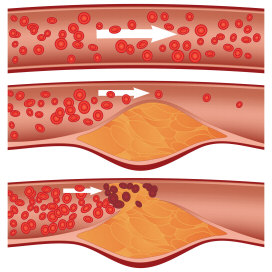15 Healthy Benefits to Regular Meditation
 Meditation has been touted for millennia as a practice that relieves stress,
clears the mind, relaxes the body, aids in sleep, and has many other benefits.
In the 1960s, it was pushed for transcendental reasons that may or may not have
paid off for any given individual. Today, itís much more common for mindfulness
meditation to be suggested to regular people. Mindfulness meditation and many
other styles donít have to have anything to do with religion, though it can if a
person wants it to. Instead, a person might focus on their breathing to the
exclusion of all else or watch a candle flicker. Meditation has been touted for millennia as a practice that relieves stress,
clears the mind, relaxes the body, aids in sleep, and has many other benefits.
In the 1960s, it was pushed for transcendental reasons that may or may not have
paid off for any given individual. Today, itís much more common for mindfulness
meditation to be suggested to regular people. Mindfulness meditation and many
other styles donít have to have anything to do with religion, though it can if a
person wants it to. Instead, a person might focus on their breathing to the
exclusion of all else or watch a candle flicker.
They might listen to a guided meditation recording for a set period of time
or do a series of relaxation exercises, focusing on those and only those. Yoga
and tai chi also have meditation components built into them. Doctors will now
suggest meditation as part of a healthy lifestyle change for patients with hypertension, psychiatrists
prescribe it for anxiety, and physical therapists add it to treatment plans for
recovering from injuries. How many of those benefits are actually backed up by
science, and which are complete bunk? Below, weíll explore fifteen truly healthy
benefits to regular meditation.
15) Improved Optimism
 Mindfulness meditation has
existed since about 1500 BCE. In that time, itís been believed to have varied
mental health effects. Today, weíre seeing research that records brain waves
before, during, and after a set meditation program. In one study published in
Psychosomatic Medicine, participants had their brain waves recorded via EEG.
They were then divided into two groups: the meditation group and the waiting
list control group. Mindfulness meditation has
existed since about 1500 BCE. In that time, itís been believed to have varied
mental health effects. Today, weíre seeing research that records brain waves
before, during, and after a set meditation program. In one study published in
Psychosomatic Medicine, participants had their brain waves recorded via EEG.
They were then divided into two groups: the meditation group and the waiting
list control group.
For eight weeks, the meditation group followed a clinically set mindfulness
meditation program. At the end of eight weeks, all participants underwent
another EEG. The meditation group showed an increase in electrical activity in
certain regions of the left frontal cortex. This activity indicated that the
meditators had become more positive and optimistic over the preceding eight
weeks. This held true with another set of EEGs four months later. Meditation has
a clear effect on optimism that can be measured quantitatively, not just
qualitatively, and that alone might make it worth starting a meditation program.
14) Stress Reduction
Even a few minutes of meditation can reduce
stress. Because meditation is considered a kind of mind-body complementary
medicine, the effects on your mental processes ó the emotional stress ó can
affect the physical manifestations of stress, such as tension, raised blood
pressure, increased pulse and more.

Because meditation can be performed anywhere and only take a few minutes, closing your eyes and focusing on your
breathing right before a stressful meeting might make the meeting go better and
without as many negative effects. There are many
other kinds of meditation, including yoga, mantra meditation, guided meditation, qi
gong, tai chi, and transcendental meditation; any of these may help with stress,
but mindfulness meditation is easier to perform anywhere and can be beneficial
if it is performed only for a few moments.
13) Better Emotional Response to Distress
 Compassion meditation may improve
emotional responses to distress. Compassion meditation is a specific kind of
meditation that involves the idea of opening the mind and heart to increase
compassion toward yourself and others. In order to practice compassion
meditation, you should find an analogy that works for you to explain how
compassion builds slowly. One suggested one is that of building a fire in a
storm. Sincerity is also important. Think about those youíve seen have a hard
time of it and wish them good fortune and freedom from their sorrow and stress.
As you practice it more, you can begin applying the principles of compassion to
yourself and those around you. Compassion meditation may improve
emotional responses to distress. Compassion meditation is a specific kind of
meditation that involves the idea of opening the mind and heart to increase
compassion toward yourself and others. In order to practice compassion
meditation, you should find an analogy that works for you to explain how
compassion builds slowly. One suggested one is that of building a fire in a
storm. Sincerity is also important. Think about those youíve seen have a hard
time of it and wish them good fortune and freedom from their sorrow and stress.
As you practice it more, you can begin applying the principles of compassion to
yourself and those around you.
The process of building on compassion this way reduces emotional distress in
response to stressors. You can easily find textual or auditory compassionate
meditation guides on the internet. If this sounds like something that might help
you, itís a good idea to check it out, since there are proven benefits regarding
emotional responses to distress.
12) Relaxation
Relaxation techniques have been taught for some time with the goal of
reducing tension and psychological distress. It wasnít until a 2007 article in
Annals of Behavioral Medicine that relaxation techniques and mindfulness
meditation were directly matched up to see which had more benefits for sufferers
of psychological distress. The test group was made up of 83 students with a mean
age of 25. They were split randomly into two groups, each of which did a
one-month training program in their respective assignments (mindfulness
meditation or somatic relaxation).

At the end, the researchers measured rumination (fixation on negative
thoughts), distractive thoughts, positive states of mind, and psychological
distress, among other factors. Both scored equally in decreasing stress and
increasing positive mood, and both had a great effect on distress levels. The
meditative group showed a greater effect for positive state of mind than did the
somatic relaxation group, as well as decreases in distractive and ruminative
thoughts and behaviors. Therefore, mindfulness meditation may be even more
beneficial than somatic relaxation training for you if you want to increase your
ability to relax.
11) Improved Attention and Concentration
 A 2007 article published in the Proceedings of the National Academy of
Sciences of the United States of America looked at the impact of five days of
meditation using an integrative mind-body technique on attention. According to
the article, previous studies had shown that months to years of intensive
meditation had an impact on attention, but no short-term course of meditation
had been studied until this. The study used an experimental group of 40 Chinese
undergraduate students and employed a training method based in traditional
Chinese medicine, as well as incorporating other mindfulness and meditation
training. A 2007 article published in the Proceedings of the National Academy of
Sciences of the United States of America looked at the impact of five days of
meditation using an integrative mind-body technique on attention. According to
the article, previous studies had shown that months to years of intensive
meditation had an impact on attention, but no short-term course of meditation
had been studied until this. The study used an experimental group of 40 Chinese
undergraduate students and employed a training method based in traditional
Chinese medicine, as well as incorporating other mindfulness and meditation
training.
For five days, the researchers gave the students twenty minutes of
integrative training. At the end of the five days, the experimental group showed
greater improvements in attention, as well as lowered anxiety, fatigue, anger
and depression. Tests showed lower levels of stress-related cortisol (a hormone
the body releases when under distress) and a higher mood score. It conclusively
showed that just five days of a specific course of meditation can greatly
improve attention and, therefore, concentration, which is particularly useful
for students at any level of education.
10) Lowered Blood Pressure
 One in three American adults
is
diagnosed with hypertension, or high blood pressure, while another thirty
percent of adults have pre-hypertension. Medication may not always be
appropriate, and doctors frequently try to get patients to employ lifestyle
changes before giving medications that may have unpleasant side effects.
Fortunately for patients with pre-hypertension and hypertension, not to mention
their stressed doctors, in April 2013, the American Heart Association released a
report that discussed alternatives to medication when it comes to treating
hypertension. It looked at safe, effective alternative approaches to managing
hypertension, as well as approaches that arenít so effective. Specifically, it
discussed acupuncture, yoga, relaxation therapies, biofeedback, mindfulness
meditation, aerobic exercise, and transcendental meditation, among others. While
the greatest levels of change were with patients who employed aerobic exercise,
isometric hand grip exercise, and dynamic resistance exercise, two behavioral
therapies outperformed the others. One in three American adults
is
diagnosed with hypertension, or high blood pressure, while another thirty
percent of adults have pre-hypertension. Medication may not always be
appropriate, and doctors frequently try to get patients to employ lifestyle
changes before giving medications that may have unpleasant side effects.
Fortunately for patients with pre-hypertension and hypertension, not to mention
their stressed doctors, in April 2013, the American Heart Association released a
report that discussed alternatives to medication when it comes to treating
hypertension. It looked at safe, effective alternative approaches to managing
hypertension, as well as approaches that arenít so effective. Specifically, it
discussed acupuncture, yoga, relaxation therapies, biofeedback, mindfulness
meditation, aerobic exercise, and transcendental meditation, among others. While
the greatest levels of change were with patients who employed aerobic exercise,
isometric hand grip exercise, and dynamic resistance exercise, two behavioral
therapies outperformed the others.
Specifically, those were transcendental meditation and biofeedback. Other
meditation techniques were not recommended to treat high blood pressure (which
is not to say theyíre useless for everything or even everyone; they just didnít
show consistent enough definitive results to be recommended).

The best choice is
to integrate alternative therapies with mainstream ones, specifically weight
loss, a low sodium diet, refraining from smoking, physical activity, and taking
medications if prescribed. Still, transcendental meditation can make a definite
difference in hypertension and pre-hypertension, and itís certainly worth
trying.
9) Improved Immune System Functioning
The same Psychosomatic Medicine as we discussed in the increased optimism point
(number fifteen) studied the effects of mindfulness meditation on immune
function. After the eight-week period of teaching mindfulness meditation to the
experimental group, both the experimental and control groups were given
influenza vaccines. Four months later, they were all tested for influenza
antibodies by blood test. The test group showed a significant increase in
antibody titers than the control group. Perhaps more surprisingly, the
increase in antibodies could be predicted by how much left-side brain function
there was.

In other words, if a participant had only mildly increased brain function
(and therefore optimism), their antibody titers would be only mildly increased
compared to the control group. If a person had greatly increased brain function,
they would also have much greater antibody presence than would the control
group. Fortunately for the control group, they then underwent the same
eight-week mindfulness training program as did the original experimental group.
Itís well worth seeing if mindfulness meditation will help you if you have
problems with negativity and possibly if your immune system functions poorly, as
this study shows.
8) Better Physical Responses to Distress
 The ScienceDaily.com article that discussed an improved emotional response to
distress as a result of compassionate meditation also discussed the studyís
findings on physical responses to distress after compassion meditation training.
The study particularly looked at its impact on immune and neuroendocrine
responses on the physical response side. The experimenters used the Trier Social
Stress Test to use consistent stressors on every participant. To test
physiological responses, they drew blood to test for cortisol (the stress
hormone) and interleukin 6 (which both causes and decreases inflammation as an
immune response). There was no overall difference between the groups regarding
either interleukin 6 or cortisol, but those with increased meditative practice
had decreased levels of interleukin 6 in response to the Trier Social Stress
Test. The ScienceDaily.com article that discussed an improved emotional response to
distress as a result of compassionate meditation also discussed the studyís
findings on physical responses to distress after compassion meditation training.
The study particularly looked at its impact on immune and neuroendocrine
responses on the physical response side. The experimenters used the Trier Social
Stress Test to use consistent stressors on every participant. To test
physiological responses, they drew blood to test for cortisol (the stress
hormone) and interleukin 6 (which both causes and decreases inflammation as an
immune response). There was no overall difference between the groups regarding
either interleukin 6 or cortisol, but those with increased meditative practice
had decreased levels of interleukin 6 in response to the Trier Social Stress
Test.
They also had a greater result with interleukin 6 if they meditated above the
average than did those who meditated below the average. Therefore, someone who
practices compassion meditation might not have a better cortisol response than
before beginning compassion meditation, but they will have a better interleukin
6 (inflammatory and immune response) reaction to distress.

Several studies
looking at the correlation between mindfulness meditation and physiological
responses to distress are ongoing. You might want to look them up in a few
months to see if thereís a notable improvement versus compassion meditation. In
the meantime, it canít hurt to try compassion meditation.
7) Relief from Symptoms of Chronic Illnesses
 A metastudy published in Holistic Nursing Practice looked at existing
literature regarding the clinical effects of meditation on chronic illness,
among other things. It found that the clinical impact of meditation when it came
to chronic illness includes reduced pain, anxiety, stress, and depression and
enhanced self-esteem and mood. This included the results of studies of patients
with fibromyalgia, psoriasis, hypertension, and even cancer who were taught
meditative techniques. A metastudy published in Holistic Nursing Practice looked at existing
literature regarding the clinical effects of meditation on chronic illness,
among other things. It found that the clinical impact of meditation when it came
to chronic illness includes reduced pain, anxiety, stress, and depression and
enhanced self-esteem and mood. This included the results of studies of patients
with fibromyalgia, psoriasis, hypertension, and even cancer who were taught
meditative techniques.
According to the metastudy, practitioners can teach simple mindfulness
techniques in the office, which means chronically ill patients arenít required
to get themselves to yet another place or appointment to spend time on yet
another thing to help with their symptoms. Experiences with chronic illnesses
show that patients are less likely to go to multiple appointments or hold
favorable impressions of secondary appointments because of the work involved;
your own experiences probably reflect that. Therefore, anything that can be
taught at one appointment and may help alleviate even a few symptoms might help
a patient take the new information and apply it thoroughly enough to create a
positive change. This is just as true for meditation as it is for any other
health-related practice, possibly even moreso than things like physical therapy
that can themselves temporarily worsen pain and fatigue.
6) Better Coping Abilities
One of the benefits
of meditation is an increase in coping skills. Studies have
consistently demonstrated that regular meditation practitioners have better such
skills than do non-practitioners. Mindfulness
and meditation techniques have been incorporated into treatment of behavioral
disorders, as well as treatment of alcohol and drug abuse. Those
in a ďrelapse road mapĒ may help patients use appropriate coping skills as
needed. That can help prevent a relapse and give patients greater independence
in dealing with their addiction and temptation.

A study in which incarcerated substance abusers were taught
mindfulness meditation, specifically the Vipassana tradition, in which the
inmates reported that it helped them be mindful of urges and ďstay in the
momentĒ, which made it easier to cope with the urge to use the substance they
were addicted to. As depression and borderline personality disorder are similar
to substance abuse in that patients use poor coping techniques in stressful
situations, the fact that dialectical behavioral therapy incorporates
mindfulness meditation and is used with borderline personality and depressive
patients means it may also be useful with inmate populations dealing with
substance abuse problems. That meshes with known studies and is certainly worth
trying. As it can help people cope with depression, borderline personality
disorder, and substance abuse problems, mindfulness meditation has the potential
to help anyone cope with their problems. A side benefit is how easy it is to
learn and employ in many situations.
5) Improvement in Mental Fatigue
 A 2005 article published in the International Journal of Behavioral Medicine
looked at the impact of mindfulness-based stress reduction on fatigue, mood,
sleep, and stress in cancer patients. The mindfulness-based stress reduction was
a mindfulness meditation program taught to sixty-three cancer patients. The
experimenters specifically taught the experimental group a two-part mindfulness
program: self-regulation of attention to immediate experiences, which leads to
recognition of events in present moment awareness, and orientation of acceptance
of moment-to-moment experience and openness. According to the authors, this is
similar to mindfulness as conceptualized by attitude, attention, and intention.
Intention means directing attention to moment-to-moment experiences. A 2005 article published in the International Journal of Behavioral Medicine
looked at the impact of mindfulness-based stress reduction on fatigue, mood,
sleep, and stress in cancer patients. The mindfulness-based stress reduction was
a mindfulness meditation program taught to sixty-three cancer patients. The
experimenters specifically taught the experimental group a two-part mindfulness
program: self-regulation of attention to immediate experiences, which leads to
recognition of events in present moment awareness, and orientation of acceptance
of moment-to-moment experience and openness. According to the authors, this is
similar to mindfulness as conceptualized by attitude, attention, and intention.
Intention means directing attention to moment-to-moment experiences.
Attitude means the attention should incorporate gently non-judgmental
acceptance. The study resulted in significantly reduced sleep disturbances in
the test group, as well as significantly improved quality of sleep. Fatigue,
mood disturbance, and stress also all greatly improved. Because the first side
effect of cancer treatment is often fatigue and it tends to last the longest, up
to a year or more after treatment, the fact that mindfulness meditation can help
so much is a great sign for cancer patients. If it can help cancer patientsí
fatigue, it may also stand a good chance of helping healthy people who have
fatigue from being on the go constantly; if nothing else, it may help with sleep
quality, which then improves fatigue. If you have fatigue, itís certainly worth
learning mindfulness meditation techniques to help with it. As weíve seen
before, mindfulness meditation has many other benefits.
4) Reducing Negative Emotions
Negative emotions are a persistent, pervasive problem for many people. Just
about anyone will undergo a period in which negative emotions are prevalent,
whether or not they have accompanying depression. Meditation can help you cope
with these negative emotions by changing your attitude and the way you pay
attention to them. One study discussed in the International Journal of
Neuroscience matched twenty-five control subjects with 25 subjects who practiced
Sahaja Yoga. Yoga is a form of meditation that involves focusing on specific
movements and relaxation techniques.

The study was a long-term look at how Sahaja Yoga affected the subjectsí
responses during non-emotional arousal, including viewing an emotionally neutral
movie clip, as compared to viewing an emotionally aversive movie clip. Their
reactions were tested with EEGs and compared to the control groupís EEGs during
the same tests. It showed that the control group had a higher right hemisphere
than left electrical activity, indicating increased arousal. The meditators, on
the other hand, showed no such imbalance between the two hemispheres. This
indicates that practicing meditation can help you deal with negative emotions
more neutrally than you might otherwise. If youíre easily upset or in a negative
period, try some form of meditation to help. Yoga might be a particularly good
choice, since the study looked specifically at that.
3) Increased Self-Awareness
 Mindfulness meditation in particular correlates with an increase in
awareness, particularly self-awareness. According to a study published in
Neuroreport in 2006, prior research showed that long-term meditation practice
resulted in altered resting EEG patterns. The experimenters looked at twenty
test subjects with extensive insight meditation experience and took MRIs of
their brain structures and compared them to a similar group of non-meditators.
The MRIs showed that meditators had relatively thicker brain structures that
relate to interoception (perceived sensations in internal organs, including
awareness of sodium levels in the blood, pulmonary stretch receptors, the sense
of suffocation if oxygen levels are too low, skin sensations including blushing,
reactions to blood-borne drugs and hormones, gastrointestinal stretch receptors,
sensory receptors in the esophagus, pharynx sensory receptors, sensory receptors
relating to sensations of fullness in the bladder and rectum, sensations of
pain, and vasodilation receptors that may result in pain), specifically the
right anterior insula. Mindfulness meditation in particular correlates with an increase in
awareness, particularly self-awareness. According to a study published in
Neuroreport in 2006, prior research showed that long-term meditation practice
resulted in altered resting EEG patterns. The experimenters looked at twenty
test subjects with extensive insight meditation experience and took MRIs of
their brain structures and compared them to a similar group of non-meditators.
The MRIs showed that meditators had relatively thicker brain structures that
relate to interoception (perceived sensations in internal organs, including
awareness of sodium levels in the blood, pulmonary stretch receptors, the sense
of suffocation if oxygen levels are too low, skin sensations including blushing,
reactions to blood-borne drugs and hormones, gastrointestinal stretch receptors,
sensory receptors in the esophagus, pharynx sensory receptors, sensory receptors
relating to sensations of fullness in the bladder and rectum, sensations of
pain, and vasodilation receptors that may result in pain), specifically the
right anterior insula.
The thicker brain structures also related to attention and sensory processing
and included the prefrontal cortex (related to planning complex cognitive
behavior and executive function). The insight meditation the experimental group
practiced specifically relates to attention and mindfulness. Based on the MRI
results, it has a significant effect on self-awareness of the body and its
systems, as well as planning complex acts and thinking about higher ideas.
Insight meditation or simply mindfulness meditation may well help you pay
similar attention to your own body, actions, and thoughts.
2) Increased Youth Relative to Chronological Age
An April 2013 Boston Globe article discussed how meditation aids aging brains
in functioning better and staying relatively younger than chronological age.
According to the piece, research suggests that mindfulness meditation in
particular may help preserve brain function in the aging population. A
three-month course resulted in indications that it may actually help people live
longer due to lowered stress levels. Studies are ongoing; meditationís benefits
overall have only really been studied since 2000. By 2011, there were 490 more
articles than before 2000. Because so much research is left to do, studying the
effects on the aging brain specifically still needs to be done before firm
conclusions can be drawn. A Harvard University psychiatry instructor said that
an eight-week class in mindfulness meditation can increase familiarity with how
we evaluate and perceive the world.

Meditation helps eliminate negative self-talk over time, which reduces stress
and therefore helps lower relative brain youth. It helps people learn that
self-talk is opinion, not fact, and is not necessarily backed up by how others
perceive the world. It also helps people in middle age and beyond let go of
unhelpful habits and behaviors theyíve acquired over the years. Further, it may
help people make choices that help emotional, physical, and mental flexibility,
rather than the rigidity of acquired thought and movement patterns. Mindfulness
regarding eating is another form of meditation that involves paying close
attention to what you eat, may help you eat less, and lets you discover which
foods you might not actually like that you thought you enjoyed. All these
combined help aging people maintain mental and physical youthfulness relative to
their age. The best part is that meditation can be started at any age and degree
of health; with time, it may have a positive impact on just about anyone.
1) Mental Health Improvement
An article published in the June 2013 edition of the Natural Medicine Journal
looked at the impact of yogic meditation specifically on caregivers of dementia
patients. The study implemented a randomized assignment of subjects to either an
eight-week session of relaxation or daily yogic meditation for caregivers,
mildly depressed and elderly, of dementia patients. Clearly, care for
dementia patients is a demoralizing job. When the caregiver is an elderly
person, all too often the dementia patient is a parent or spouse, which makes
the task even harder. The study used 49 subjects, 39 whom actually completed it.
Twenty-three were in the yogic meditation group, and 16 were in the relaxation
placebo group. Thirty-seven of the subjects were women. The experimenters used
the Hamilton Rating Scale for Depression and the Mental Health Composite Summary
Score to judge the degree of impact each group experienced between the beginning
of the study and the end.

The Mini-Mental Status Exam, California Verbal Learning Test, Trail Making A
(which tests speed of processing and attention) and Trail Making B to test
executive function. The yogic meditation group showed much greater improvements
in mental health, depression, and telomerase activity (which correlates with
general health). More than twice the percentage of the meditation group
experienced a fifty percent or greater improvement of depression than did the
control group as measured by the Hamilton Scale for Rating Depression. As far as
the Mental Health Composite Summary Score, 52 percent of the meditation group
experienced a 50 percent or greater improvement in their depressive symptoms,
which only 19 percent of the control group did. These are, clearly,
statistically significant differences. We can conclude from this that meditation
helps with overall mental health, at least concerning depression, which is
something that can help a huge segment of the population. Depression is a
serious problem in the United States, and non-pharmaceutical approaches to mild
depression have the potential to help many people.
Conclusion
Itís clear that meditation has real positive effects on mental and physical
health, ranging from stress responses to pain levels to mild depression. If you
want to help your mental, emotional, and physical health, seriously consider
trying meditation. You donít have to take a class; you can find a podcast, CD,
DVD, or even written instructions that can help you get started.
Spirituality
15 Healthy Benefits to Regular Meditation
How To Be Comfortable In Uncomfortable Situations
Sleep Paralysis Ė An Opportunity for Something More
Enhancing Your Intuition
How to Achieve Ultimate Happiness
Tips on How to Become a Happier Person
Maintaining a Positive Mindset to Prevent Emotional Turmoil
Understanding and Dealing with Anxiety Around Holidays
Reality Creation and my Story
Flickering Flame Meditation Technique
ADD and ADHD fact or fiction?
How fasting will save your life and make you lose weight |